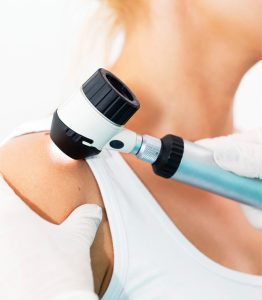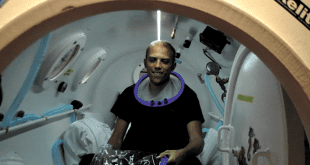 There are several different types of skin cancers ranging from mild and treatable to severe and life-threatening. Melanoma is by far the most detrimental due to its rapid proliferation. 1 in 5 people will develop skin cancer, and this year alone in the United States, over 100,000 new cases of melanoma are expected to be diagnosed, and over 7,000 of those will result in death.
There are several different types of skin cancers ranging from mild and treatable to severe and life-threatening. Melanoma is by far the most detrimental due to its rapid proliferation. 1 in 5 people will develop skin cancer, and this year alone in the United States, over 100,000 new cases of melanoma are expected to be diagnosed, and over 7,000 of those will result in death.
Due to patient education, many skin cancers are diagnosed early and, the earlier, the better as far as treatment and optimal outcomes. However, many people still put off or avoid dermatological screenings.
DON’T PUT OFF SKIN CANCER SCREENINGS. On average, skin cancer screenings only take about fifteen minutes. These few minutes of your time could potentially save your life.
For Patients, The Screening Is Easy And Straightforward
During the screening, your Dermatology Practitioner will carefully examine your skin from the scalp to the bottom of the feet for any abnormalities. If you notice a new lesion, mole, or any skin issue that looks different than it did before, do not put off a visit to your dermatologist’s office. It’s imperative to have screenings.
Along with the unfortunate diagnosis of skin cancer, including melanoma, many other skin disorders can be detected in your dermatologist’s office with a thorough skin cancer screening and examination. A dermatologist can diagnose up to 3,000 different skin disorders. On a regular basis, you should have a screening at least once a year. Because some forms of skin cancer grow very rapidly, if you are experiencing any new lesions, bumps, or moles that are of concern, you should schedule a dermatology appointment immediately.
The symptoms to look for in moles or lesions are outlined in this simple acronym, ABCDE:
A—Asymmetry
B—Border Irregularity
C—Color-Variegated or a Halo Effect
D—Diameter (>6 mm)
E—Evolving
In addition to the symptoms above, there are supplementary signs to look for, which include:
A—Amelanotic (Pink or Red Lesion)
B—Bleeding/Bump (Raised Lesion)
C—Color Uniformity
D—De Novo Development
(A New Development <6mm)
What You Can Do To Protect Your Skin
. Avoid the sun between 10:00 am and 3:00 pm
. Wear sun protective clothing (hats, long sleeves)
. Apply broad-spectrum SPF of 30* or higher every two hours (reapply immediately after swimming or sweating)
. Avoid sitting by windows that allow in UV light (wear SPF at all times)
. Get regular skin cancer screenings and exams
*ForCare Dermatologists recommend a broad-spectrum SPF of 30 with zinc as the active ingredient. This protects against UVB and UVA
UV Rays
The reason we hear so much advice on wearing sunscreen, sunglasses, and avoiding over sun exposure between 10:00 am to 4:00 pm, is due in large part to the sun’s harmful UV rays during the time when the sun is the highest in the sky. But just because it’s darker, cloudier and cooler, that doesn’t mean it’s any safer.
UV radiation has multiple levels; for example, UVC rays are the most harmful to the skin and eyes, but the ozone layer blocks many of the rays. UVA rays play a huge role in causing skin damage and aging. The wavelengths of UVA rays are long and are therefore less harmful than UVB rays. UVB rays are extremely damaging to the skin and eyes and can cause cancer. UVB rays are shorter wavelengths and consequently can even penetrate through glass, so while driving in a car, or sitting by a window at work, the UVB radiation can harm you. It’s best to always protect yourself by wearing sunscreen and protective clothing.
Be Proactive About Protecting Your Skin
Because early detection is the key to successful treatment, continual emphasis on the importance of regular skin screenings are critical to your health. Proactive prevention through sun protection and early diagnosis continue to be the smartest strategies.
ForCare Medical Practice in Tampa, FL
ForCare medical practice is dedicated to improving the health of Tampa, FL and surrounding areas. With advanced treatment options and passionate providers. They have a comprehensive practice that includes, dermatology, rheumatology, primary care and a clinical trials division.
Let the ForCare team help you take charge of your health for both preventative and proactive medical care.
To schedule your appointment, please call ForCare today at (813) 733-7523 or visit 15416 North Florida Ave, Tampa, FL 33613
 Central Florida Health and Wellness Magazine Health and Wellness Articles of the Villages
Central Florida Health and Wellness Magazine Health and Wellness Articles of the Villages


